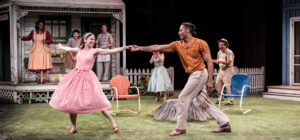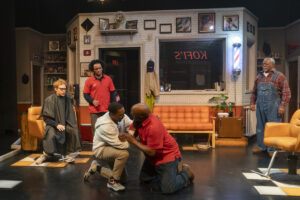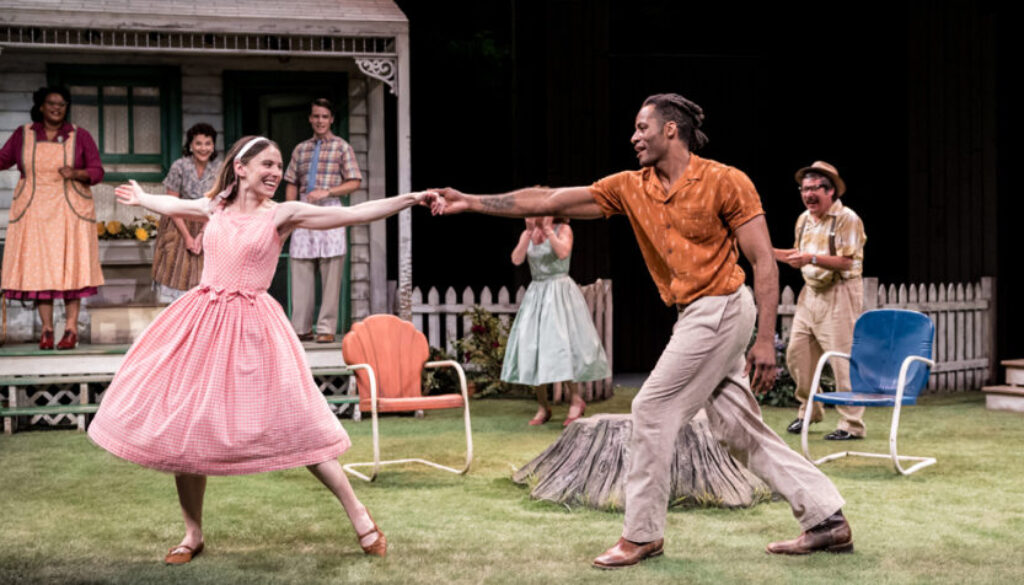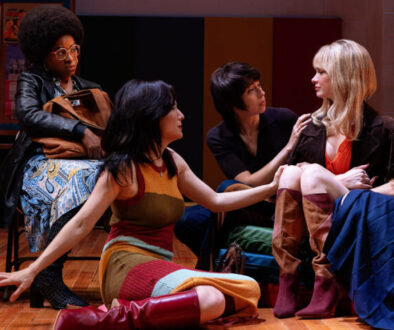By ANNE SIEGEL
SPRING GREEN, Wis. – There’s no better time for out-of-state visitors to head towards Wisconsin than right now. Some people might stay at campgrounds, others may find a secret fishing spot, and some will be searching for the latest antique finds. Avid theatergoers, however, know that satisfaction awaits in the verdant landscape of Spring Green. For almost 50 years, an abundance of theatrical entertainment is created each summer by the artisans at American Players Theatre.

This year, American Players is having a moment of national recognition. The 2025 Newsweek Readers’ Choice Awards have named American Players as the #1 choice for Best Outdoor Theater Performance.
Let’s face it: APT is known for astonishing its audiences with its typical mix of Shakespeare, classics, contemporary works and world premieres. Keep in mind that plays by Shakespeare, as well as shows with larger casts, are reserved for the outdoor Hill Theatre (about 1,100 seats). To get there, theatergoers must take a long hike up a semi-steep hill to find the large amphitheater. It’s practically impossible to get lost, and APT staffers are eager to help guide the way.
This is APT’s original home, and on a sparkling summer evening, it can’t be beat. (Elderly and mobility-challenged patrons are encouraged to use one of the complimentary shuttle buses that travel up and down the hill.)
The Best Time to Visit is Now
August is prime time to visit American Players Theatre. Nearly all of the season’s nine plays are being performed in rotation. This schedule (known as rotating repertory) allows theatergoers to take in three, or even four shows in a long weekend.
This arrangement may be chaotic, but it works. This abundance of theatrical riches attracts about 100,000 audience members each year. A good share of these visitors hail from nearby Illinois.
A recent visit by this Milwaukee-based reviewer included three of the productions that were available to view in mid-July. Two of the shows, Fallen Angels by Noel Coward, and Picnic by William Inge, are being performed on the outdoor stage. A third show, The Barber and the Unnamed Prince, is offered in the far more intimate (and air-conditioned) indoor theater.
A ‘Remarkable’ World Premiere Worth Seeing
Staging world premieres is nothing new at American Players. In fact, these premieres are one of the most eagerly anticipated shows of the season. The premieres often sell out the fastest (sometimes due to the smaller number of seats in the indoor theater). APT audiences realize that American Players chooses its offerings with care, and a good time is almost guaranteed.

Of the three shows sampled in mid-July, The Barber and the Unnamed Prince stands out as the most powerful, provocative, humorous and compelling of the three plays.
What’s more, the show’s playwright is one of American Players’ own regular contributors.
Playwright/director Gavin Dillon Lawrence is a name that is well-known among American Players audiences. He has directed two memorable shows: August Wilson’s Ma Rainey’s Black Bottom in 2024 and Tarell Alvin McCraney’s The Brothers Size.” {Note: The latter play will open an Off-Broadway revival next month, starring André Holland (“Moonlight”).}
Lawrence also directs this very personal drama, which incorporates reflections of his own recent trips to Washington, D.C., a city where he grew up.
As the play begins, things are changing quickly. A number of formerly Black neighborhoods are becoming gentrified. That is both a positive (current landowners reap rising prices for their businesses), and a negative (the dramatic shift in the neighborhood’s clientele.)

The case study for this theme is a time-honored Black barbershop, owned by Kofi (David Alan Anderson). The barbershop has been around for decades, and it has seen better days. Two old-fashioned barber chairs sit front and center. The shop’s lack of a television (or even a working radio) are a sign that the barbershop is going to seed. Behind the chairs, there’s a sad leatherette couch for waiting customers.
Except customers aren’t coming in often these days, and that’s a problem for the barbershop’s future. But as the play opens, attention must be paid to the untimely passing of a local legend. Kofi and his lone employee, Sweep (Nathan Barlow), raise a toast to a legend of the local Black community.
To Kofi and Sweep, the elderly man’s passing is a sign of the changing times.
The new play conjures a rich assortment of characters. All of them are Black, with the exception of a young white dude (Josh Krause) who provides comic relief in the second act. In a nod to fellow playwright August Wilson, there’s also an elderly sage (Cedric G. Young) who is known as the Prophet of Twelfth St. He has a stunning monologue in the second act that illuminates a chapter of Black history that often isn’t taught in schools.
Although the specifics of this world may be unfamiliar to some, the play also contains themes that are universal: love of family, the youthful struggle against authority, and parental hope that education will lift their children out of poverty. As characters filter in and out of the barbershop, it’s clear that what affects one person will inevitably affect the others. This play is sensitively told, and many performances (through September 25) are already sold out.
A Delightful ‘Picnic’ Revives a Forgotten Classic
It’s amazing to think that William Inge’s classic play, Picnic, hasn’t been staged previously at APT. The play is available to see now, and it continues through September 13. Its director is APT artistic director Brenda DeVita.
Inge’s play was considered somewhat racy when it originally was staged in 1953. It’s certainly not viewed that way today, making the palatable for teens as well as adults. Families should definitely consider adding this play to their roster of APT shows. (Very young children may not be interested in the plot, except for a brief fight scene between two young women (!) and a few other action-packed moments.)

Picnic was well-known in its time, earning Inge a Pulitzer Prize and a pair of Tony Awards. Two years later it was made into a popular film, starring William Holden and Kim Novak. Holden received an Academy Award for his role, as did another actress, Susan Strasberg.
Inge’s play will bring nostalgic overtones to audiences of a certain age. The play is set in an unspecified time that seems to be either late 1940s or 1950s. The glorious set (by Takeshi Kata) consists of the two back porches of facing homes, with one backyard between them. Every inch of these weathered homes has been modeled to perfection, including the front steps leading up to the house occupied by Madge (Alina Taber), her little sister Millie (Kelly Simmons) and their mother Flo (played by APT staple Tracy Michelle Arnold).
Across the way from them lives Mrs. Potts (Dee Dee Batteast) and her unseen, elderly mother. As the adult women chat, Mrs. Potts eventually takes a fresh quart of bottled milk from her stoop inside.
Trouble begins to unsettle this small Kansas town with the arrival of the handsome, muscular Hal (Rasell Holt). He is described in the script as a “young vagabond.” He is certainly an oddity in this community, as he fails to subscribe to the notions that the community has taken as gospel. olt
Staged here in summer, the setting is ideal for the play’s timeline. The play takes place over Labor Day, and there’s lots of dialogue about trying to keep cool in the summer heat. Tempers flare, and hearts begin to soar. There’s a sense of urgency, as the town’s most eligible bachelor (Colin Covert) will soon be leaving for college. But something happens that fateful night that will bond Madge not to Alan (whom she finds dull) but to the mysterious Hal.
Picnic is in many ways, a slice of American pie. It’s also a cautionary tale of small towns that may encourage small minds on the parts of its inhabitants.
A Comedy That Never Gets Old
The third installment of this reviewer’s sample is Noel Coward’s Fallen Angels. Although this play never reached the heights of the playwright’s more familiar work – such as Hay Fever, Blithe Spirit, Present Laughter or Private Lives – it contains the charm, naughtiness and sophistication for which the Englishman was known.

APT does a particularly good job of staging these types of comedies, and Fallen Angels will keep audiences laughing until it’s time to go home.
The play is set in a living room (with a grand winding staircase to the front door). Everything exudes opulence in shades of cream (including the baby grand piano) and gold. In perfect harmony with Scott Penner’s set is the enchanting lighting by Dawn Chang. Tall pillars in the dining room are topped with Art Deco-designed lighting fixtures. Again, the setting is primed for sleek sophistication, wit and over-the-top drama. Shannon Cochran directs.
It should be noted that Coward himself was drawn to Wisconsin many times before his death in 1973. Those who visit a historical site known as Ten Chimneys (outside of Milwaukee) will hear the tour guide share many stories involving Noel Coward. He was a good friend of Lynn Fontanne and her husband, Alfred Lunt. The couple was known for inviting New York friends to visit them in Wisconsin (by train).
APT seems to have inherited a bit of Coward’s spirit in Fallen Angels. Two wealthy, married women, Julia (Phoebe Gonzalez) and Jane (Laura Rook) are about to meet an old flame from the past. Their affairs occurred prior to their marriage. Conveniently, the two husbands have scheduled a golf outing that will take them away from their London homes.
So the women are left to plot, and pine, and engage in all sorts of upper-class nonsense before the arrival of this paramour (a disarmingly charming Ronald Roman-Melendez). He only makes an appearance near the final scenes. Providing more consistent comic relief is Saunders, the maid. As with many of Coward’s maids, Saunders is much more intelligent than anyone who employs her. In fact, Saunders (Colleen Madden) chimes in with advice on everything from golf to piano playing,
As implied in the play’s title, the men are mere foils for the crafty, wacky women who propel the action to its inevitable conclusion. In addition to the elaborate set and lighting, the exquisite period costumes are by Fabio Toblini. The play’s run continues through October 3. This is another family-friendly show, as young children will focus on the hilarious action sequences and won’t pay much attention to the play’s subject matter.
What Else is Playing in Spring Green?
Glad you asked. Here’s a run-down of what’s On the Hill: Shakespeare’s A Midsummer Night’s Dream (through October 5); Anna in the Tropics by Nilo Cruz (through September 26) and Shakespeare’s The Winter’s Tale (through October 4).
Indoors, there’s the following: Art by Yasmina Reza (through September 28), Tribes by Nina Raine (through September 27) and The 39 Steps by Patrick Barlow (opens October 22 and has been extended through the end of November).
Please note that in earlier press materials, The Barber and the Unnamed Prince appears under a different title: The Death of Chuck Brown. The change was made at the request of the Brown family. Aside from eliminating Brown’s name and references to Brown in the play, it follows the same schedule as The Death of Chuck Brown.
For tickets, order online at americanplayers.org, or call the box office at 608-588-2361.





